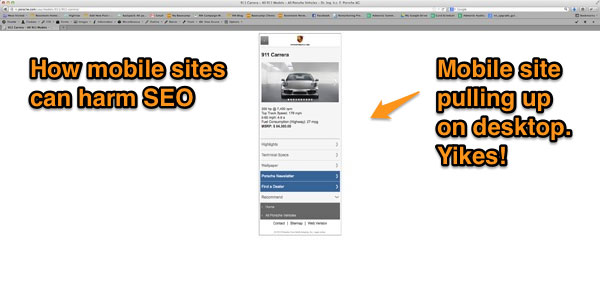Google: Poor Mobile Experience Will Affect Rankings

The world of web development was rocked by Google’s announcement earlier this year promoting responsive web design. Wasting no time at all, our “search leader” has spoken yet again, only this time about mobile search. In a blog post last week titled, “Changes in rankings of smartphone search results”, Google’s Yoshikiyo Kato and Piere Far announced impending changes in their search algorithm for mobile searches. So what does this mean? Let’s just say, the news is not good for sites with poor mobile SEO.
Part of the Process to Improve Mobile Search
This announcement falls in line with Google’s plan to improve mobile search. After giving the not-so-subtle hint to move to responsive sites, Google is following up with motivation to redesign your site for mobile searches:
“To improve the search experience for smartphone users and address their pain points, we plan to roll out several ranking changes in the near future that address sites that are misconfigured for smartphone users.”
We, as a group that uses our phones to search Google, can rejoice. However, as owners of websites, we have some work to do. When the changes are rolled out, webmasters and business owners alike will likely see their sites drop in rankings if they haven’t optimized for mobile searches.
An Example of Poor Mobile SEO
“What is poor mobile SEO?” you may wonder. There are many examples of poor mobile SEO, and we even pointed out a common mobile SEO mistake in a previous blog post: When you search for “porsche 911 turbo” in Google, Porsche’s mobile site incorrectly appears on the desktop search (see image below). Note: since the publication of the blog post, Porsche fixed the error and now the desktop site shows up first in the search results.

Mobile fail.
This is called a faulty redirect, and according to Google, it makes for a poor search experience. According to the authors, “These faulty redirects frustrate users whether they’re looking for a webpage, video, or something else, and our ranking changes will affect many types of searches.” Bottom line, Google wants anyone who uses their search engine to find exactly what they are looking for.
Be Proactive Instead of Punished
The good news is that a more mobile-ready search will be better for users. Google says mobile-optimized sites will “improve the mobile web, make your users happy, and allow searchers to experience and experience your content fully.” However, Google doesn’t say when the changes would be coming. So in the meantime, take a couple minutes to learn more about responsive design, then contact us so your Rosemont Media consultant can walk you through your mobile options. By proactively adjusting for mobile search, your site will weather this next change in Google’s search algorithms.